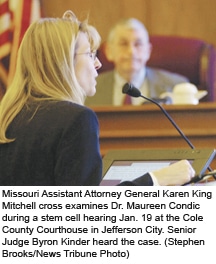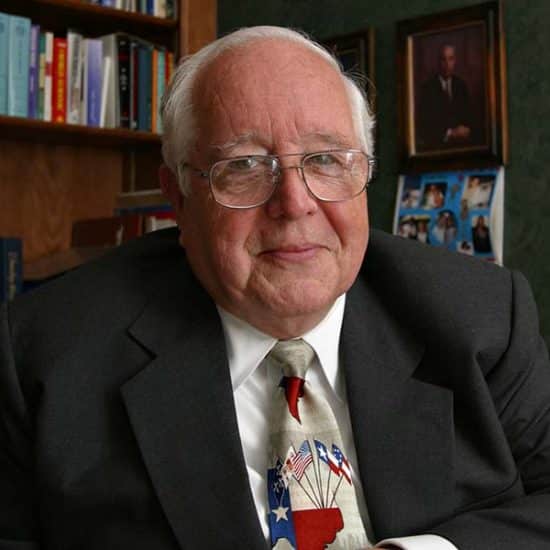By Vicki Brown, Word&Way Associate Editor
Jefferson City — Opponents of a proposed state constitutional amendment will have to step up efforts to educate voters, while proponents of the measure seek the 145,000  signatures needed to get it on the ballot in November.
signatures needed to get it on the ballot in November.
Cole County Circuit Court Senior Judge Byron Kinder ruled Jan. 19 that the Secretary of State's wording of the ballot summary "is sufficient, fair, accurate and impartial."
Alliance Defense Fund of Scottsdale, Ariz., representing Jefferson City-based Missourians Against Human Cloning, filed legal action in November in an effort to change the wording of the ballot summary for the Missouri Stem Cell Research and Cures Initiative. If passed, the initiative would change the state's constitution to allow somatic cell nuclear transfer (SCNT) research in Missouri.
Six Missouri bishops joined the suit shortly after it was filed.
The Missouri Coalition for Lifesaving Cures backs the proposal and is leading the petition drive to get the initiative on the ballot.
The Missouri Baptist Convention put its weight behind the legal effort in mid-December when the MBC Executive Board, MBC president Ralph Sawyer and Executive Board member Cindy Province were allowed to intervene in the case.
At issue was whether the ballot summary's wording was misleading. In SCNT, scientists replace the nucleus of an unfertilized egg with material from a "somatic" or mature body cell of a particular organ, such as the skin or a nerve. The egg cell is stimulated, and the new cells created as the original divides are harvested for research.
Although the proposed amendment includes a ban on human cloning, plaintiff attorneys argued that the summary language does not explain that the SCNT process, used to produce the cloned sheep, Dolly, can be used to clone a human being. Plaintiffs wanted the summary to clearly differentiate between the use of SCNT for "therapeutic" and "human reproductive" cloning.
Arguments at the hearing centered on the definition of "embryo," but skirted the emotionally charged issue of determining when life begins.
For the plaintiffs, Dr. Maureen Condic, an associate professor of human embryology at the University of Utah, explained the human reproductive and the SCNT processes.
In SCNT, the genetic information is removed from the nucleus of an egg cell. DNA is extracted from a mature or somatic cell and fused in the egg cell nucleus. Condic believes the process creates a one-celled human embryo.
Once the new cell is formed and matured to what scientists call the blastocyst stage, it can be implanted in a surrogate mother or used for research. Condic called the first process cloning for human reproduction and the second cloning for therapeutic research.
"The only way to ban human cloning would be to prevent or ban somatic cell nuclear transfer," she said.
The plaintiffs argued that the ballot summary would not make the distinction clear, particularly for voters who might reject the measure on religious grounds.
Missouri Assistant Attorney General Karen King Mitchell argued that the ballot wording "adequately summarizes" the proposed amendment. The summary is simply a short restatement of the main points in the amendment.
Defense attorneys produced two expert witnesses — Dr. William Barlow Neves, president and chief operating officer of the Stowers Institute in Kansas City, and Dr. Douglas Melton, co-director of stem cell research at Harvard University.
Both professionals said most of the scientific community defines an embryo at a later stage of development, after the single cell has multiplied and the resulting blastocyst has implanted itself or been implanted in a uterus.
Melton said the term "cloning" as used in the scientific community simply means "making several copies." He said the word means making copies of DNA, of a cell or of an organism.
Both experts challenged the use of the terms "therapeutic" and "reproductive" to differentiate types of cloning, alleging the words are used primarily in popular media.
And both men defined a human embryo as "from implantation to the end of the eighth week of development."
Mitchell also stressed what she believes is the popular understanding of life. "Most Missourians don't believe a few hundred cells in a dish equals a human being," she said in opening remarks.
Judge Kinder did not allow part of the testimony from Bishop Robert Finn of St. Joseph. Bishop Finn testified that the Catholic Church teaches human cloning is "immoral" and a "grave evil" because it "manufactures" human life. He called the production of an embryo as an object of medical research "particularly repugnant."
"The understanding of the beginning of human life is irrespective of how it came about," the bishop said. "The dignity, value and worth of human life derive from God the Creator."
Judge Kinder interrupted the bishop at several points, noting that "the teachings important to the church and to the faithful are outside the scope of this hearing." The case, he added, was not "a political one or a religious one" but rather the "determination of words."
The judge also questioned Melton, asking if cloning had produced any lifesaving cures to date.
Melton responded that it had not, but predicted the procedure would do so in his lifetime.
Province was prepared to testify on behalf of the MBC, but was not called. Province, associate director of the St. Louis Center for Bioethics and Culture, currently is completing a doctorate in bioethics at the University of Wisconsin at Milwaukee.
The plaintiffs have 10 days from the date the judge's ruling was filed to appeal.
In addition to participation in the lawsuit, the MBC plans to spend $137,000 on education efforts to defeat the initiative. (01-27-06)

